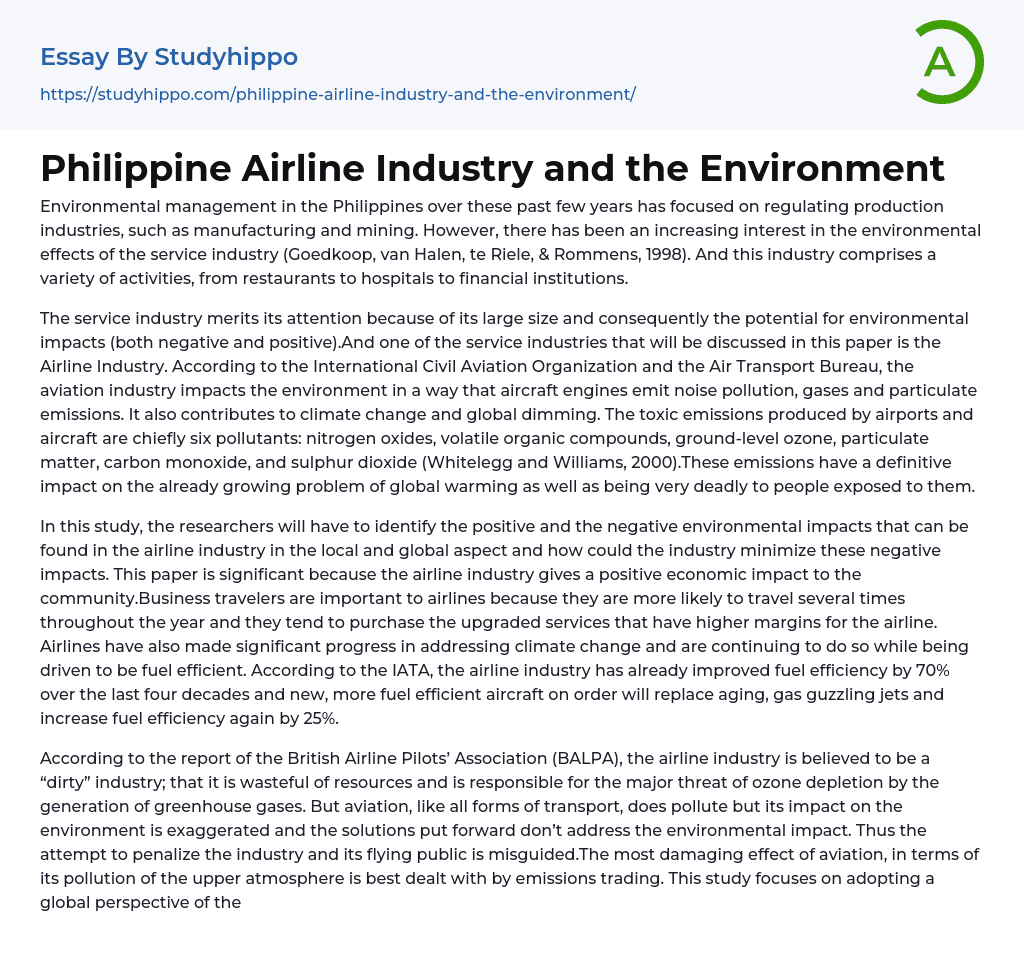

Philippine Airline Industry and the Environment Essay Example
In recent years, the environmental management efforts in the Philippines have mainly centered around monitoring the activities of manufacturing and mining industries. However, there has been a growing concern regarding the impact of service-related sectors, including restaurants, hospitals, and financial institutions, on the environment (Goedkoop, van Halen, te Riele, & Rommens, 1998).
The Airline Industry, which belongs to the service industry, has considerable environmental implications and potential effects. The International Civil Aviation Organization and the Air Transport Bureau both report on the aviation sector's negative impact on the environment, caused by emissions from aircraft engines that result in noise pollution, gases, and particulates contributing to climate change and global dimming. Whitelegg and Williams (2000) identify six toxic pollutants discharged by airports and airplanes: nitrogen oxides, volatile organic compounds, ground-level ozon
...e, particulate matter, carbon monoxide, and sulfur dioxide. These pollutants pose a serious threat to individuals exposed to them while also contributing to climate change.
The objective of this research is to examine the positive and negative environmental consequences of the aviation sector on both local and global scales, while also seeking ways to mitigate any adverse effects. This study is significant because airlines have a beneficial economic impact on communities, and business travelers are highly valued due to their frequent travel requirements and preference for upgraded services that generate greater profit margins. In spite of these benefits, the industry continues to make concerted efforts in addressing climate change and improving fuel efficiency. IATA reports a 70% improvement in fuel efficiency over the past four decades, with newer aircraft models replacing older ones resulting in an additional 25% increase in fuel efficiency.
The report by BALPA
suggests that the aviation industry is often viewed as damaging and excessive, with greenhouse gas emissions contributing significantly to ozone depletion. Although inadequate solutions have been proposed, penalizing both the industry and its passengers may not be the best approach. Emissions trading has proven to be the most effective method of addressing adverse effects on the upper atmosphere. As air travel is a global operation, its impact on climate change will have worldwide consequences. Therefore, the airline sector plays a crucial role in preserving local and global environmental conditions.
- flood essays
- Traffic essays
- Renewable Energy essays
- Carbon Dioxide essays
- Greenhouse Gas essays
- Ecology essays
- Pollution essays
- Environmental Issues essays
- Air Pollution essays
- Nature essays
- Water Pollution essays
- Climate essays
- Hurricane essays
- Tornado essays
- Tsunami essays
- Endangered Species essays
- Deforestation essays
- Environmental Protection essays
- Sustainability essays
- Stream essays
- Environmental Disaster essays
- Sustainable Development essays
- Environment Pollution essays
- Plastic Pollution essays
- Animal Welfare essays
- Zoo essays
- Plastic essays
- Waste Management essays
- Climate Change essays
- Global Warming essays
- Conservation essays
- Recycling essays
- Oxygen essays
- Atmosphere essays
- Coral Reef essays
- Desert essays
- Earth essays
- Ocean essays
- Lake essays
- Sea essays
- Biodiversity essays
- Natural Environment essays
- Forest essays
- Soil essays
- Water essays
- Rainbow essays
- Ecosystem essays
- Volcano essays
- Wind essays
- Forestry essays



